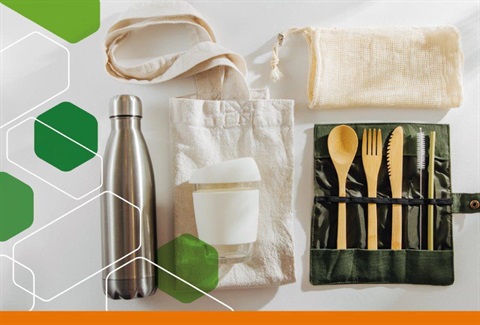Reducing single use plastic

Did you know? Single use plastic containers and packaging are often used for just a few minutes, but are designed to last a lifetime. Get on the front foot and be part of the solution - choose to refuse single use plastic.
Energy and resources are used to produce single use plastic products so it is important to think about whether we really need to use these items or if we can avoid them, find alternatives or think ahead and bring your own.
With so many more sustainable options available, making a small shift in our purchasing choices and BYO bags, bottles, cups and cutlery makes a big difference. That's why Queensland is tackling plastic waste and ensuring that Queensland businesses stop supplying specified single-use plastic items. Find out more about the ban below.
Queensland's single-use plastic items ban!
As part of Queensland’s plan to tackle plastic pollution (PDF, 4 MB) and following support from the community, retailers and industry organisations, the Single-use Plastic Items Ban was introduced.
The supply of the following single-use plastic items have been banned from 1 September 2021 in Queensland:
- straws: regular straws, flexible straws, straws with a scoop, cocktail straws and bubble tea straws
- cutlery: knives, forks, spoons, teaspoons, sample tasting spoons, soup spoons, chopsticks, splayds and sporks
- bowls and plates
- stirrers: hot or cold drink stirrers, swizzle sticks and hot or cold food stirrers
- expanded polystyrene takeaway food containers and cups, for example ‘clamshell’ style containers
Queensland Government expanded the ban the following single-use plastic items from 1 September 2023:
- cotton buds with plastic stems
- expanded polystyrene loose packaging
- plastic microbeads in rinseable personal care and cleaning products
- heavy weight plastic shopping bags
- the mass release of lighter than air balloons
If you're associated with a food retail business in the Rockhampton Region and want free, personalised support and assistance to go plastic-free, JOIN Plastic Free Places CQ.
Choose to refuse!
The single-use plastic items ban will make a huge difference, but we all still have to choose to refuse other pesky plastic items. A great way to do this is to check out Plastic Free July's simple ways to avoid single use plastics. Over two million people take up the Plastic Free July challenge each year so why not give it a go and keep choosing to refuse all year round. Below are some top tips to get you started!
- Sign up to Plastic Free July's 'choose to refuse' challenge and receive loads of plastic free tips to your email.
- Take the Pesky Plastics Quiz to help you track down where your plastics come from.
- Check out the 'what others do' Plastic Free July page with lots of plastic free options you can put in place throughout your home, including considering natural fibres, reassessing cleaning products, bulk food shopping, checking beauty and hygiene products plus much more.
BYO bottle, bag, containers and cutlery!
'Bringing your own' is a great way to avoid single use items altogether, whether they be made of plastic or compostable alternatives.
- Put together a little BYO kit including a reusable water bottle, cutlery, bag and containers and pop it in your bag, car and take it with you when you are out and about.
- Choose to dine in at your local cafe to avoid single use items or bring your own reusables if you are taking away.
Reuse, repurpose, recycle!
Reusing, repurposing and recycling plastics correctly is important to ensure these items do not end up as litter.
- Get creative and repurpose plastic items to give them an additional use.
- Get involved with collecting containers for change.
- Get your household recycling sorted with Recycle Mate to check what items can be put in your household recycling bin and find community recycling drop-off locations near you.
Keep helping solve the plastics problem!
There are some more proactive actions you can look into to help solve the plastic problem.
There are so many more helpful resources available to assist you to learn more about reducing single use plastic in your household. Check out some of them below.